Kathleen Hall Jamieson is the Director of the University of Pennsylvania’s Annenberg Public Policy Center and our favorite expert to help us decode political rhetoric and communications on the campaign trail.
We asked Jamieson to look at much talked-about speeches made last week by President Obama and his presumed opponent Mitt Romney at the annual convention of the American Society of Newspaper Editors, and share what struck her about their rhetorical choices. Below are Jamieson’s thoughts.
On Hidden Agendas

President Barack Obama speaks at The Associated Press luncheon in Washington, Tuesday, April, 3, 2012. (AP /Pablo Martinez Monsivais)
President Obama and Governor Romney each accused the other of trying to obscure or conceal key actions that would be taken if elected.
For Governor Romney, the hidden agenda involved foreign policy; for President Obama, it was the Republican budget proposal (a.k.a. the Ryan budget). President Obama characterized the congressional Republican budget as “a Trojan horse” that “disguised” a “radical vision” of the country as “deficit reduction plans.” Governor Romney said that remarks President Obama made to Russian President Medvedev, captured on an open microphone, called the incumbent Democrat’s “candor into serious question” and added, “He does not want to share his real plans before the election, either with the public or with the press…. He is intent on hiding.”
Underlying this back and forth is a damaging character attack by each that implies a wily opponent bent on deception. Each attack is digested in the opposing candidate’s attack-ad-ready word. For Governor Romney, the indicting term is the one he used to describe the Ryan budget plan — “marvelous” — a word that according to Obama is one “you don’t often hear when it comes to describing a budget. (Laughter.) It’s a word you don’t often hear generally. (Laughter.)” For President Obama, the damning noun caught on the “hot mic” in his conversation with the Russian leader is “flexibility” — by which Romney says the Democrat means that “what the American public doesn’t know won’t hurt him.”
Apart from revealing a line of character assault, these two passages are noteworthy for a second reason. If the public accepts the assumption that a candidate is hiding true intent, it may tolerate fear-based rhetoric about an imagined future. For a helpful check on the claims and counterclaims of those speeches see our FactCheck.org article titled “Fall Preview: Obama vs. Romney (and Ryan).”
What’s Left Unsaid
One way the candidates can push each other into revealing their true intentions is by making an assumption that forces the unspoken into the open. So for example, in his ASNE speech, President Obama says of the House Republican budget, “I want to actually go through what it would mean if these cuts were to be spread out evenly.” He then forecasts that Republicans will respond by saying “we’ll avoid some of these cuts” and implies that what licenses him to make the assertions about cuts in specific social programs is the fact that “they don’t specify exactly the cuts they would make.”
The Obama move elicited the expected response from Governor Romney — not a list of programs that would be cut but an assurance that “you wouldn’t cut on a proportional basis. There would be some programs you would… eliminate.”
Of course, neither President Obama nor Governor Romney is eager to reveal what programs each would be willing to cut to address the debt and deficit crisis we face. Nor were Senators McCain and Obama in their 2008 contest. Recall the repeated failed effort of general election debate moderators to elicit such detail.
On “Social Darwinism”
President Obama said in his speech that the Republican budget “is really an attempt to impose a radical vision on our country. It is thinly-veiled Social Darwinism.”
I think we get a sense of his intended meaning by reading the sentences that followed. Speaking of the Republican budget embraced by Romney, he said:
“It is antithetical to our entire history as a land of opportunity and upward mobility for everybody who’s willing to work for it; a place where prosperity doesn’t trickle down from the top, but grows outward from the heart of the middle class.”
I suspect that he is trying to say that the Ryan budget creates a world in which the vulnerable will have a much more difficult time prospering. Survival of the fittest. Every person for him or herself. The problem with the phrase “Social Darwinism” is that in historical context it can be heard to mean that when groups compete, the one that is innately or biologically superior is more likely to thrive, a notion used to rationalize inequality and justify eugenics. Since I don’t think President Obama intended those associations, he would be well advised to retire the phrase.
Take Action
Learn more about Stand By Your Ad, a campaign launched by Flackcheck.org that empowers people to urge local TV stations refuse to accept and air untruthful or misleading political advertising.

